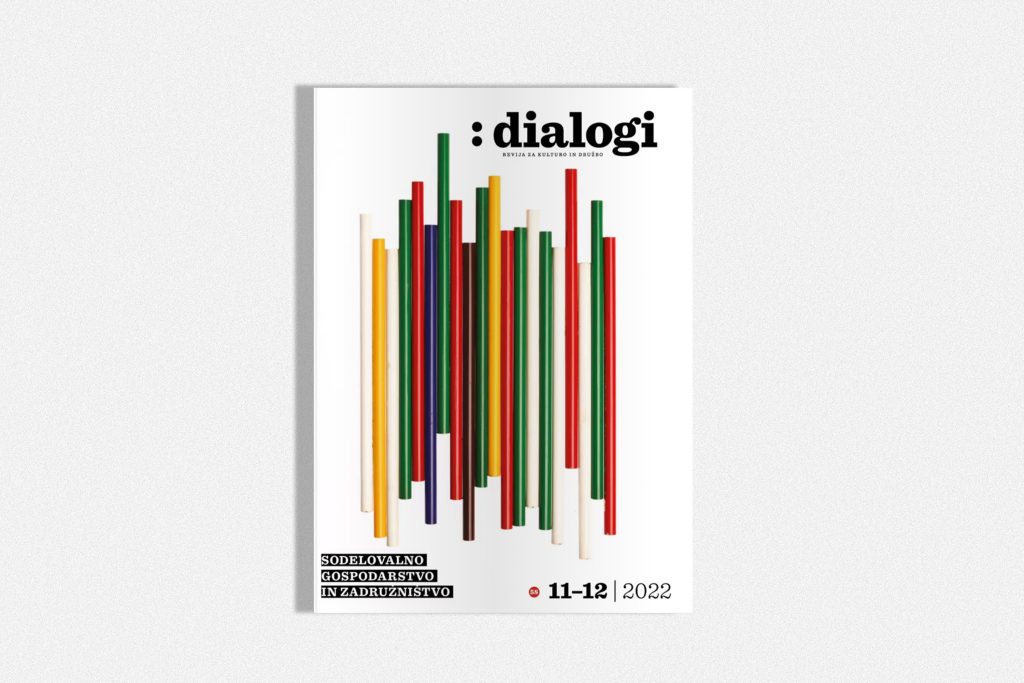
The crux of different peoples’ history, and of humanity as a whole, is always food and hunger. In the final analysis, it’s the stomach that counts.
How individuals and communities can become autonomous co-creators of their lives: on practices of participatory economics, from cooperative housing to agricultural and credit cooperatives and joint musical creation.
‘We live in interesting and exciting times,’ write Dialogi editors Meta Kordiš and Ciril Oberstar. ‘A time of social and economic upheaval and the ever-present climate crisis. Our daily economic practices, addressing of housing issues and even our leisure activities are framed by a neoliberal view of society. Democracy and the remnants of a welfare state are under attack. Capitalism is not an economic system that can sustainably solve pressing environmental and climate problems. Even less so can the neoliberal ideology that props it up.’
‘One possible and perhaps correct response, which leads to a fairer socioeconomic system that is also environmentally friendly and good for all living creatures, is a participatory economy, in which participation is manifested in the form of cooperation in the ownership, management, creation and consumption of products and services.’
‘The best-known model of the participatory economy, although far from the only one, is the cooperative. Within cooperatives, it is possible to create together, spend together, live together, create music together… in short, there is no aspect of life that cannot be organized cooperatively or communally. But the key here is not only the form of management, but also the ethical aspects of participatory or cooperative operation, strengthening of autonomy of the individual and a better life.’

Michael Albert, author of the pathbreaking book Parecon: Life After Capitalism (2003), argues in interview for participatory economics as a model of a new social and economic vision of world development and a possible alternative form for the organization of a post-capitalist society. Karolina Babič follows with an explanation of the practices of a social and solidary economy and a definition of cooperatives. She describes how social enterprises differ from conventional enterprises and, by elaborating on the forms of participation in cooperatives, equips us with a conceptual apparatus for understanding and evaluating a participatory economy.
It is through the principle of shared creation and joint consumption that, Babič writes, ‘the ultimate goal of participation is shown, as a process of co-creating living conditions and ways of life in which individuals as well as communities become autonomous co-creators of their lives.’
Franci Avsec deals with the legal aspects of cooperatives in Slovenia and internationally, before moving to an analysis of their financial structure. He shows the extent of cooperatives in Slovenia and their share in the Slovenian economy, suggesting legal reforms from the standpoint of intergenerational fairness.
Historical analysis shows that cooperatives were product or response to capitalism. They eased the transition from feudal relations to a capitalist economy for the lower classes and promoted solidarity and education. At the same time, cooperatives did business with one another in the context of capitalist competition.
Without committed cooperative members – initially priests, and later those from lower social classes schooled and educated in the Cooperative School – cooperatives would not have grown into a movement, writes Žarko Lazarević. As a community, the cooperative enforced mechanisms of financial and economic control among its members. Anyone who did not follow the cooperative rules, as well as the moral framework of the time, could quickly fall out of the safety net.
Through an analysis of Austro-Hungarian statistics, Jure Stojan presents an economic model of cooperatives and places it in the broader context of the dual monarchy. He describes the dynamics of mistrust and suspicion between economic entities and the state bureaucracy, which wanted to systematically collect and process statistical data. Cooperatives were modest in terms of their capital, he concludes, and over the years increasingly moved away from the monetary economy.
Up until the Second World War, writes Marta Rendla, housing cooperatives in Slovenia were based on collective mutual aid and the solidarity of their members. With the advent of the socialist mass housing, however, they offered a higher standard of homes and at the same time influenced prices on the real estate market, as rents and apartments became cheaper.
In emphasizing coexistence based on solidarity over competition between tenants (even among applicants for nonprofit housing), housing cooperatives are a practice of resistance against the neoliberalization of the housing question, write Anja Lazar, Maša Hawlina and Rok Ramšak. Cooperative movements solve the housing problem from the bottom up, they argue, but can only succeed with the help of appropriate regulatory policies and legal standards.
Under socialism, cooperatives were established from the top down, which was in complete contradiction to the essence of cooperativism, writes Martina Malešič. Market mechanisms were applied, intentionally or not, while solidarity and democracy were merely superficial, or took shape despite mandatory volunteer work and financial contributions.
Rajko Muršič describes the intertwining of mutual aid, sharing and heritage creation that took place in the music scene and other alternative milieus in Maribor under socialism.
He reflects on how ‘we often forget that history is woven from coincidences and personal misunderstanding of the situations in which we find ourselves. But it is this unpredictability of life that dictates reliance on inherited practices, and that is why the collective experiences of past generations appear in unpredictable ways in modernity.’
Published 5 April 2023
Original in English
First published by Eurozine
Contributed by Dialogi © Eurozine
PDF/PRINTSubscribe to know what’s worth thinking about.

The crux of different peoples’ history, and of humanity as a whole, is always food and hunger. In the final analysis, it’s the stomach that counts.

The gig economy is undermining labour rights rapidly, but the conventional protections around employment have been eroding for decades. We talk labour migration, the gendered division of unpaid tasks, and the history of the workers’ movement on our latest episode.